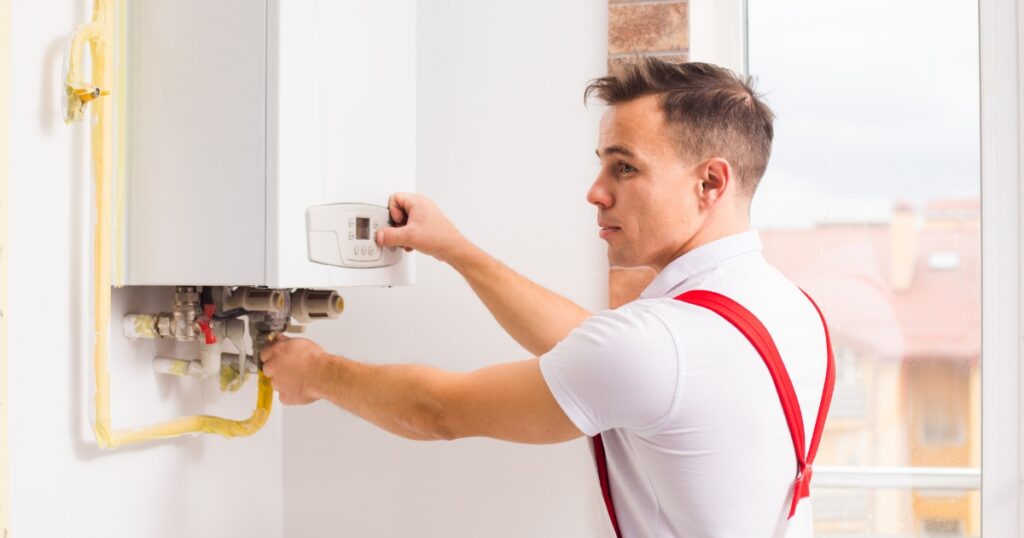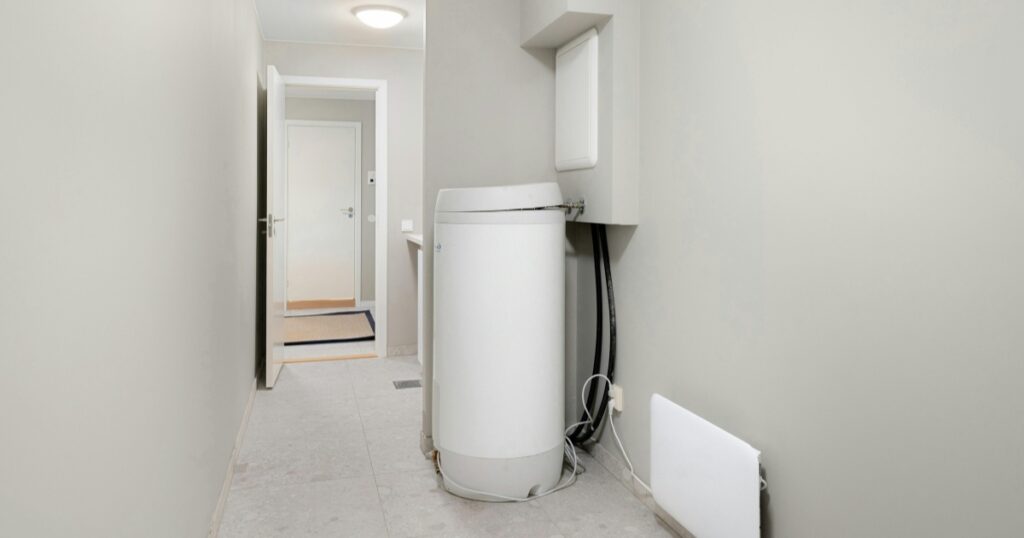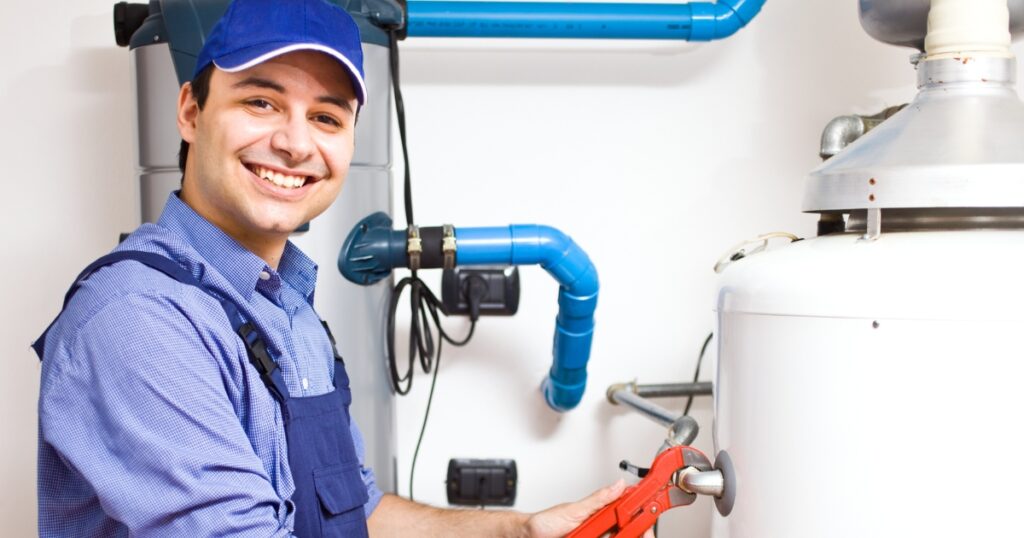Gas plumbing issues can be a real corker, especially when your hot water system sensors decide they’ve had enough. We know the drill – it’s as if they have a mind of their own sometimes.
Through our experience, we’ve noticed that even a small hitch like a dirty burner can throw these vital little gadgets off kilter. In this comprehensive guide, we’re set to tackle common problems with hot water system sensors head-on and equip you with some ripper troubleshooting tips to identify and fix them safely yourself.
So get ready – armed with our handy hints, combating those tricky sensor issues is about to become as easy as snagging snapper from the Swan River!
Key Takeaways
- Hot water system sensors, such as thermostats and flow sensors, are crucial for maintaining consistent water temperature and efficient operation.
- Signs of sensor issues include inconsistent water temperature, discoloured or smelly water, unusual noises, and leaks.
- Common sensor problems include faulty sensors, clogged sensors, damaged wiring, and issues with the gas control or burner assembly.
- Troubleshooting steps include checking the thermostat and strainer valve, cleaning or replacing sensors when needed, and inspecting the wiring.
Understanding Hot Water System Sensors
Hot water systems rely on various sensors, including thermostats, flow sensors, and electronic control units (ECUs), to ensure the desired temperature and proper functioning of the system.
Types of sensors (thermostat, flow sensor, ECU)
To ensure your hot water system operates efficiently, several types of sensors play key roles. The thermostat is one such sensor that regulates the heated water’s temperature to your preferred setting.
If you notice inconsistencies in water heat, a faulty thermostat may be at fault. Next up is the flow sensor; its job relates to tracking the amount and speed of running water through your system.
A smooth-flowing operation requires a functional flow sensor; if it malfunctions, you might experience irregularities with your hot water supply or pressure changes. Lastly, we have the Engine Control Unit (ECU).
This device acts as the central processing unit for many digital systems within your hot water unit, including those managing heat and pressure control functions. The proper working condition of this ECU ensures optimal performance from both individual sensors and integrated systems as a whole in your hot water setup.
Importance of sensors for proper functioning
The proper functioning of hot water systems relies on the importance of sensors. Sensors play a crucial role in maintaining consistent water temperature, detecting any malfunctions or issues, and ensuring efficient operation.
Without functioning sensors, your hot water system may not be able to accurately regulate and maintain the desired temperature, resulting in inconsistent water temperatures or even no hot water at all.
Additionally, sensors help detect problems such as clogged filters or faulty ignitors that can affect overall performance. It is essential to prioritise regular maintenance and inspection of these sensors to prevent potential issues and ensure optimal functionality of your hot water system.
Signs of Hot Water System Sensor Issues
If you notice inconsistent water temperature, discoloured or smelly water, unusual noises, or leaks from your hot water system, it could be a sign of sensor issues.
Inconsistent water temperature
One frustrating issue that homeowners may encounter with their hot water system sensors is inconsistent water temperature.

This can be a sign of sensor problems, such as a faulty thermostat or a clogged flow sensor.
Loose electrical connections or improper installation can also contribute to this issue. It’s important to address these problems promptly, as they can affect the overall performance and efficiency of your hot water system.
By troubleshooting and repairing any sensor issues, you can ensure that your hot water system provides reliable and consistent temperatures for all your daily needs.
Discoloured or smelly water
If you notice that your hot water is discoloured or has an unpleasant odour, it could indicate a problem with the sensors in your hot water system. This issue may be caused by sediment buildup or rust inside the tank, which can affect the quality of your water.
It’s important to address this problem promptly to prevent further damage and ensure that your hot water is safe and clean for everyday use.
Unusual noises
If you’re hearing unusual noises coming from your hot water system, it could be a sign of sensor issues. These noises can range from rattling or banging sounds to hissing or screeching noises.
One possible cause is the build-up of sediment in the tank, which can cause the heating elements or sensors to overheat and make strange sounds. Another potential culprit is a malfunctioning flow sensor, which controls the amount of water flowing into the system.
If the flow sensor is not operating properly, it can create noises as it tries to regulate water flow. Don’t ignore these unusual noises as they could indicate underlying problems with your hot water system’s sensors that need attention.
Leaks
If you notice leaks in your hot water system, it’s important to address them promptly. Leaks can indicate a problem with the sensors or other components of the system. They can lead to water damage and increased utility bills if left untreated.
Check for any visible signs of leaks, such as puddles or dripping water, around the unit or pipes connected to it. It’s best to call a professional plumber who specialises in hot water systems to assess the situation and make necessary repairs. Ignoring leaks can result in further damage and more costly repairs down the line.
Common Hot Water System Sensor Problems
Some common hot water system sensor problems include faulty sensors, clogged sensors, damaged wiring, and issues with the gas control or burner assembly. Discover how these issues can affect your hot water system and learn how to troubleshoot them effectively.
Faulty sensors
If you’re experiencing issues with your hot water system, one possible culprit could be faulty sensors. Faulty sensors can cause inconsistent water temperature, discoloured or smelly water, unusual noises, and even leaks.
These problems can result from dirty burners, improper installation, loose electrical connections, or a malfunctioning flow sensor. It’s important to address these sensor issues promptly to ensure the proper functioning of your hot water system.
In some cases, troubleshooting techniques like cleaning or replacing the sensors may solve the problem. However, if you’re unsure about how to proceed or want professional assistance for repairs, it’s best to call a licensed plumber or gas fitter who specialises in hot water systems.
Clogged sensors
Clogged sensors are a common issue that can affect the performance of hot water systems. When sensors become clogged with dirt, debris, or sediment, they may not be able to accurately measure and regulate the temperature of the water.
This can result in inconsistent water temperatures and reduced efficiency. In some cases, clogged sensors may even cause the system to shut down completely. To address this problem, it is important to regularly clean or replace the sensors as part of routine maintenance for your hot water system.
By ensuring that the sensors are clear of obstructions, you can help maintain proper functionality and enjoy reliable hot water whenever you need it.
Remember: Clogged sensors can lead to inconsistent water temperatures and reduced efficiency in your hot water system. Regularly cleaning or replacing these sensors as part of routine maintenance is key to maintaining their accuracy and functionality.
Additionally: If you notice signs of sensor issues such as discoloured or smelly water, unusual noises, or leaks from your hot water system, it is important to have them checked by a professional plumber.
They will be able to diagnose any problems with clogged or faulty sensors and recommend appropriate repairs.
Damaged wiring
If your hot water system is experiencing sensor issues, one possible cause could be damaged wiring. Faulty or frayed wires can disrupt the signals from the sensors, leading to inaccurate readings and problems with temperature control.
Damaged wiring may also prevent the sensors from communicating properly with other components of the system. To address this issue, it is important to inspect the wiring for any signs of damage such as exposed wires or loose connections.
If you notice any issues with the wiring, it’s best to call a licensed professional plumber who can safely repair or replace the damaged wires and ensure that your hot water system operates smoothly once again.
Issues with gas control or burner assembly
One common issue that can affect the performance of hot water system sensors is problems with the gas control or burner assembly. If there are issues with these components, it can result in inconsistent water temperature, discoloured or smelly water, unusual noises, and even leaks.
Faulty ignitors and dirty burners are some of the specific problems that can arise. Additionally, improper installation or loose electrical connections can also lead to sensor issues.
It is important to address these problems promptly to ensure that your hot water system functions properly.

Troubleshooting Hot Water System Sensor Issues
To troubleshoot hot water system sensor issues, first, check the thermostat and strainer valve for any problems. Then, clean or replace the sensors if necessary. Inspect the wiring to ensure it is not damaged or loose.
If you’re unsure of what to do, it’s best to call a professional plumber or gas fitter for assistance with diagnosing and repairing these sensor issues in your hot water system. Remember that safety is paramount when dealing with gas plumbing repairs and always hire a licensed professional for any related work.
Check the thermostat and strainer valve
To troubleshoot hot water system sensor issues, it’s important to check the thermostat and strainer valve. Start by examining the thermostat settings to ensure they are correctly adjusted.
A faulty thermostat can cause inconsistent water temperature or no hot water at all. Next, inspect the strainer valve for any debris or blockages that may be affecting the flow of water through the system.
A clogged strainer valve can lead to reduced water pressure and other sensor-related problems. By checking these two components, you can identify any issues that may be causing sensor malfunctions and take appropriate action to address them.
Clean or replace sensors
To keep your hot water system running smoothly, it’s important to clean or replace sensors when needed. Over time, sensors can become dirty or damaged, which can affect their accuracy in measuring water temperature and flow.
By cleaning the sensors regularly, you can remove any build-up that may be interfering with their function. If a sensor is faulty or beyond repair, it’s crucial to replace it promptly to ensure your hot water system operates efficiently.
Regular maintenance of the sensors will help prevent issues like inconsistent water temperature and reduced water production.
Inspect wiring
We need to inspect the wiring of our hot water system when we are experiencing sensor issues. Faulty or damaged wiring can cause malfunctions in the sensors and lead to problems with the system’s overall performance.
Loose connections or frayed wires can disrupt the flow of electricity, resulting in inaccurate temperature readings or other sensor failures. It is important to carefully examine all wiring connections and ensure that they are secure and intact.
By addressing any wiring issues, we can help restore proper functionality to our hot water system sensors and enjoy consistent warm water throughout our home.
Call a professional plumber or gas fitter
If you’ve tried troubleshooting your hot water system sensor issues without success, it’s time to call in the experts. A professional plumber or gas fitter has the knowledge and experience to diagnose and repair complex problems with your hot water system sensors.
They can safely handle any gas plumbing involved in the repairs, ensuring the safety of you and your home. Don’t hesitate to seek their assistance when faced with stubborn sensor malfunctions that you can’t resolve on your own.
Importance of Safety When Dealing with Gas Plumbing
When dealing with gas plumbing, it is crucial to prioritise safety above all else. Gas systems can be highly dangerous if mishandled, so it is essential to follow proper procedures and take necessary precautions.
Make sure to turn off the gas supply before attempting any repairs or maintenance on your hot water system. It is always recommended to hire a licensed professional who has the expertise and knowledge to handle gas plumbing safely.
Taking these safety measures will ensure that you prevent accidents and maintain the well-being of yourself and your household.
Tips for safely handling hot water system repairs
Safety is of utmost importance when handling hot water system repairs. Here are some tips to ensure your safety while working on your hot water system. Always remember to turn off the power supply before starting any repair work.
Additionally, make sure to wear protective gloves and eye goggles to prevent injuries from hot water or loose parts. Regularly check for gas leaks by smelling for a distinct odour or using a gas detector.
It’s also crucial to follow manufacturer guidelines and instructions when handling repairs, as improper techniques can lead to further damage or accidents. If you are unsure about any aspect of the repair process, it is always best to call a licensed professional plumber or gas fitter who has expertise in handling these types of systems safely and efficiently.
Importance of hiring a licensed professional
Hiring a licensed professional to diagnose and repair hot water system sensor issues is crucial for ensuring the safety and effectiveness of your system. Licensed professionals have the knowledge, expertise, and experience to accurately diagnose problems with your sensors and provide appropriate solutions.
They understand the complexities of hot water systems and can quickly identify any potential safety hazards. Additionally, licensed professionals are trained to handle gas plumbing safely, minimising the risk of accidents or further damage to your system.
By entrusting your hot water system repairs to a licensed professional, you can have peace of mind knowing that the job will be done correctly and efficiently.
Have Your Hot Water System Diagnosed
In conclusion, diagnosing and repairing hot water system sensor issues is crucial for maintaining the proper functioning of your system. By understanding the signs of sensor problems and troubleshooting them effectively, you can ensure that you have a consistent supply of hot water in your home.
Don’t hesitate to seek professional assistance if needed, and remember to prioritise safety when dealing with gas plumbing repairs. Keep these tips in mind to keep your hot water system running smoothly.






